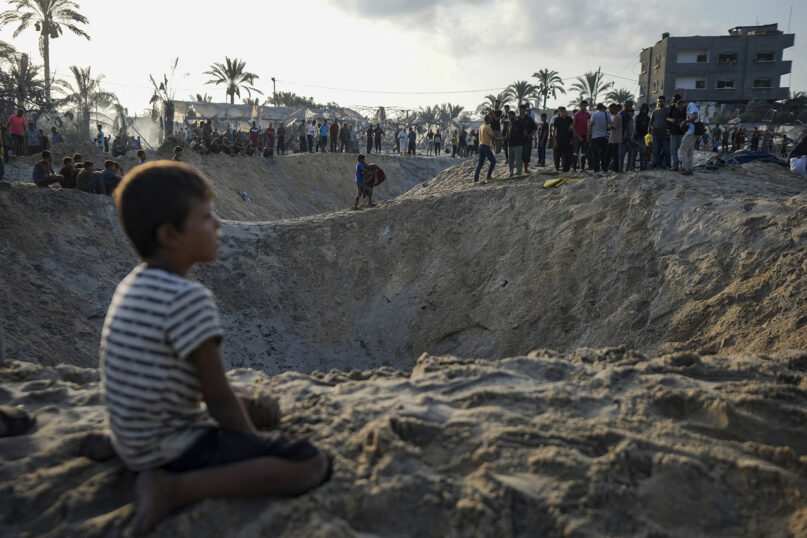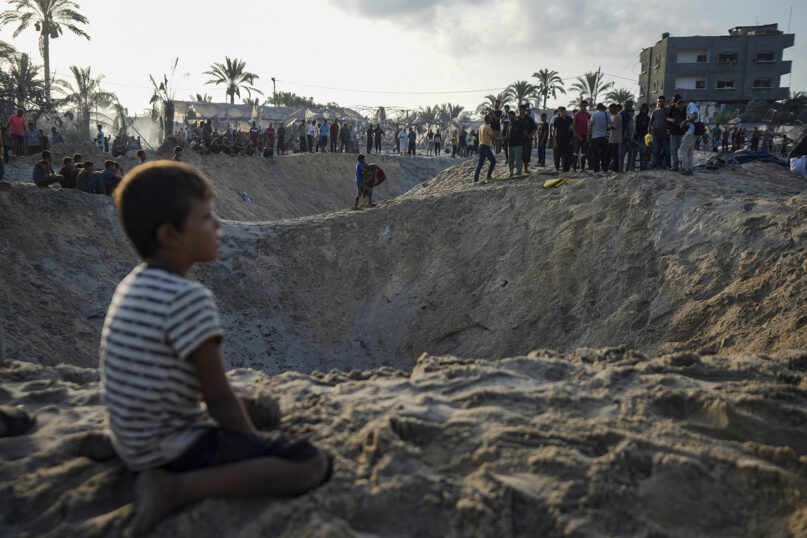
(RNS) — There isn’t one moment when Vice President Kamala Harris alienated Muslim American voters who have spent the past year agonizing over the plight of Palestinians in Gaza. Some point to her visit to a Detroit airport hangar in early August, days before she accepted the Democratic nomination for the presidency, when Harris shut down pro-Palestinian protesters.
“Kamala, Kamala, you can’t hide. We won’t vote for genocide,” they chanted after being told by Harris that “I am speaking now, I am speaking now.” As they continued to chant, Harris got angry, saying: “You know what? If you want Donald Trump to win, then say that.”
Maybe it was at the Sept. 10 presidential debate, when Harris was asked about the ongoing bombing of Gaza and massive loss of civilian life after the Hamas attacks on Oct. 7. Harris began her reply by repeating her support for Israel, weeks after the Biden administration approved $20 billion in arms sales to Israel.
But I’d wager she lost most Muslims when days of negotiation and protests, including an all-night sit-in outside Chicago’s United Center by members of the Uncommitted movement, failed to convince Harris to allow a Palestinian American to speak on the main stage.
The denial of that crumb of acknowledgment for Palestinian loss and suffering solidified what many Muslim, Palestinian and Arab Americans and others already knew: They don’t authentically matter to either of the two major presidential candidates.
“I need to sleep at night. I need to vote my conscience,” said Suehaila Amen, an organizer and activist in Detroit. “I’m sick and tired of hearing ‘Trump the bogeyman.’ … The Democratic Party is just as violent now as the Republican Party was in a post-9/11 world. I don’t see any difference in the … immensity of evil within the two candidates. They’re both violent, they both lack compassion and understanding and even humanity.”
Palestinians look at the destruction after an Israeli airstrike on a crowded tent camp housing Palestinians displaced by the war in Muwasi, Gaza Strip, Sept. 10, 2024. The Israeli strike killed at least 40 people and wounded 60 others, Palestinian officials said. Israel said it targeted “significant” Hamas militants, allegations denied by the militant group. (AP Photo/Abdel Kareem Hana)
Those who are not Muslim have often asked me why Muslim and Arab voters don’t see the virtue of voting Harris into office and then pushing her on Gaza and a cease-fire. Another Trump presidency, after all, would be detrimental on numerous fronts to Muslim and other minority communities.
But the advice to vote for the lesser of two evils is not flying now. The current administration’s abject support of Israel is something the majority of Muslim, Arab and Palestinian American voters can’t see past.
“If she and Biden didn’t do it now, more than 350 days into this, why would we believe that she will do anything after taking office?” said Dr. Nidal Jboor, a physician in Michigan who is president and co-founder of Doctors Against Genocide. “We would love it if the Democratic Party would give us an excuse to vote for them, (but) they’re doing everything to push us away. The only weapon they have is threatening us with Trump. We do hate Trump, but what else could he do? Continue the genocide?”
He added: “Our lives — Black and Brown lives — don’t matter. For (those in power), we’re just collateral damage.”
A recent survey from the Institute for Social Policy and Understanding examined the candidate preferences and policy priorities of Muslim voters in three key swing states: Georgia, Pennsylvania and Michigan. It found that whereas in 2020 64% of Muslim voters in these states voted for Joe Biden, only 18% of Muslims said they would vote for him before he withdrew. Even after Harris became the Democratic nominee, 30% of Muslim voters who had decided to not vote for Biden did not gravitate toward Harris, instead intending to vote third party or write in a candidate. (Seventeen percent declared they were still undecided.)
By far, Gaza is the top issue for Muslim voters, especially in key states, with 71% of Muslim voters in swing states choosing the war in Gaza as their top policy priority.
The dozens of Muslim and Arab Americans I’ve spoken with this summer have not forgotten the Muslim ban, the uptick in Islamophobic rhetoric and xenophobic violence, and other harmful effects of the Trump presidency. But nearly a year of bombing, and more than 41,000 Palestinian lives, nearly 16,500 of them children, supersedes any other issue for Muslim and Arab American voters.
Trump or Harris? Neither feels right for many of these voters, with some even going as far as to say that Trump couldn’t be worse given Harris and the Biden administration’s loyalties to Israel, and that some Republican Party values align more with conservative-leaning Islamic values. Amer Ghalib, the mayor of Hamtramck in the battleground state of Michigan, just endorsed Trump.
Meanwhile, Emgage, a Muslim political advocacy organization, just endorsed the Harris-Walz ticket. Both endorsements have unleashed a wave of ongoing frustration in many internal Muslim, Arab and Palestinian American community discussions, where many voters don’t see a path forward when it comes to the presidential election.
“This is the first time in our lives we have watched a genocide in real time,” Amen told me. “It has allowed us to bear witness in a way we never have before. Our diverse Muslim communities don’t agree on everything, but this is the one time (we’re) saying enough is enough. The knowledge that Palestinians have never mattered and we in this country have never mattered to either party — how can we ignore that? Neither (presidential) choice sits well.”
The bipartisan stonewalling of Muslim Americans was evident in last week’s Senate Judiciary Committee hearing on “Combating the Rise in Hate Crimes,” called by Illinois Sen. Dick Durbin in conjunction with the Chicago-based Muslim Civic Coalition. The hearing, held to examine the surge in hate crimes against Palestinian, Muslim, Arab and Jewish communities since October 2023, was meant to highlight the Wadee Resolution, which honors the life of Wadea Al-Fayoume, a 6-year-old Palestinian American boy fatally stabbed in Illinois last October in what authorities have called a hate crime.
Amina Barhumi, the advocacy and policy lead at the Muslim Civic Coalition, said that while her organization’s original plan was to have impact witnesses such as Hisham Awartani, a Palestinian American student from Brown University who was shot and paralyzed from the waist down last November, Durbin’s office insisted on expert witnesses. This included Arab American Institute Executive Director Maya Berry.
This led to the scene of Sen. John Kennedy asking Berry if she supported Hamas (she said she didn’t) or the United Nations Relief and Works Agency (she said she did) and then telling her, “You should hide your head in a bag.” Hanan Shahin, Wadea’s mother, who was stabbed 12 times herself when her son was killed, sat in silence behind Berry while the exchange took place.
Berry “was literally hate crimed at a hate crime hearing,” Barhumi said.

Maya Berry, left, and other witnesses are sworn in during a U.S. Senate Judiciary Committee hearing Sept. 17, 2024, on Capitol Hill in Washington. (Video screen grab)
But Kennedy’s vitriol obscured the indifference of Democratic senators. “This was Sen. Durbin’s hearing, and his (Democratic) colleagues did not show up,” said Barhumi. “Sen. Jon Ossoff walked in, looked around, saw a room filled with kaffiyehs and left.”
Ultimately, the Senate passed the Wadee Resolution unanimously on Tuesday (Sept. 24).
Barhumi said the treatment of Muslims this election cycle is no accident, but a political calculation. But she believes that Muslims’ choice to invest in the difficult work of politics is crucial. “Are we ready to inch towards the power we want to gain? It’s a chess board, and the game is ugly. It’s the ugliness that creates apathy, and it’s the apathy they want.
“But we have to recognize we have power,” she said. “I have as much a right to be here as you do. My values and principles are honest and authentic.”
It feels impossibly hard, though, when the last year has taught Muslim, Palestinian and Arab American communities that their votes are not sought after, their pain is not a priority. There is a pervasive feeling in internal community discussions, that the long game of politics holds little profit, which means voting for the lesser of two evils is a dead-in-the-water strategy.
(Dilshad D. Ali is a freelance journalist. The views expressed in this commentary do not necessarily reflect those of Religion News Service.)

